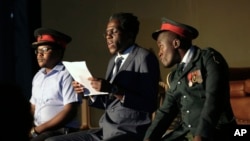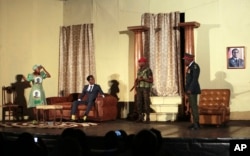Laughter has replaced fear in Zimbabwe as the dramatic events leading to the resignation of former leader Robert Mugabe are already playing out on stage.
Crowds last week packed a theater in the capital, Harare, as Mugabe and his wife were openly mocked.
Gazing out on the crowd in a public place for the first time since November, a portrait of Mugabe had become a target of ridicule, a far cry from the reverence and dread it once induced. Such portraits of the man who was once the world's oldest head of state at 93 were instantly removed after he stepped down amid pressure from the army, the ruling party and a long-frustrated public.
Some in the audience choked with laughter and others nearly fell off their chairs at the depiction of former first lady Grace Mugabe, long unpopular for her sharp temper and shopping expeditions as the once-populous country crumbled during her husband's 37 years in power.
The former first lady's political ambitions intensified the national discontent and ruling party divisions that led to a military takeover and her husband's downfall. Grace Mugabe's rival and a former presidential confidant, Emmerson Mnangagwa, took power with the backing of Constantino Chiwenga, the military commander who led the takeover.
The new play opened with a restless Grace Mugabe, brought to life by 27-year Caroline Magenga, preparing a speech for a political rally in which she plans “to bury Mnangagwa.”
In the scene, a waiter responsible for the first lady's room service is forced to sit on the floor and listen to the speech — and is quickly threatened for his suggestion that she avoid attacks on Mnangagwa.
“It was a slip of an opinion, Doctor, Your Excellency, Madam President,” he stammers apologetically.
From then on, he cheers ferociously at her every word. That is until the president, staggering, enters the Mugabe mansion under the guard of Chiwenga, who announces a house arrest.
Mixing real and imagined events, the 90-minute play has scenes that were unthinkable in Zimbabwe just months ago.
They include Grace Mugabe begging to be allowed to leave for Dubai, trying to seduce the army commander and helping the president's male Cabinet ministers to escape disguised as women.
Meanwhile, the elderly Robert Mugabe is depicted as struggling to walk, sleeping in between important negotiations and speeches and eventually agreeing to resign.
He faints at one point after a spirit medium he has consulted for guidance tells him: “The spirits are telling me you are about to get a new post: You will be head of your village.”
During Mugabe's rule, police routinely arrested artists and banned plays and documentaries perceived as critical of the president.
Now the young cast of the new play, with all of the actors under 35, receives standing ovations.
“We used real and imagined events. The play is meant to diffuse a very tense situation that we went through as a country,” said Charles Munganasa, the director.
Yet even after his resignation, Mugabe still casts a shadow on the southern African country.
“Actors were afraid to come forward when we called for auditions. It is amazing we have been able to do this without any harassment. The era of Robert Mugabe is truly over,” Munganasa told The Associated Press.
He said Zimbabwe's military supported the play by allowing actors to wear army fatigues, which are usually off-limits to civilians.
In another indication of the new freedoms of expression, the director made a dig at the former military commander, who is now the country's vice president, over his “funny” take on English words.
The play's name, “Operation Restore Regasi,” reflects Chiwenga's pronunciation of the military campaign that led to Mugabe's exit: Operation Restore Legacy.
“He always uses R where there is an L,” Munganasa said. “I hope he never says the word ‘elections’ in public.”





